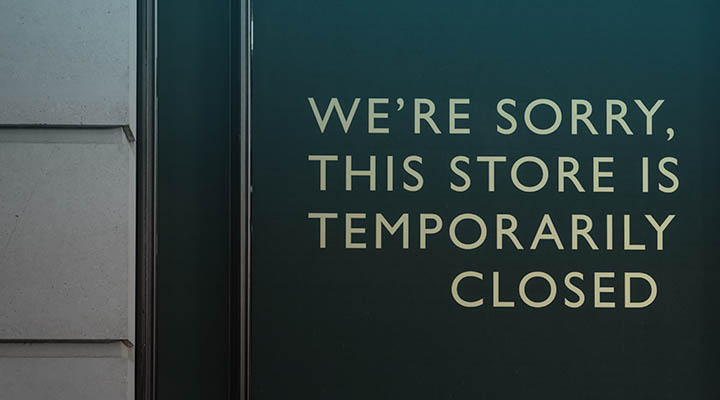We all know that retailers that rest on their laurels and fail to innovate are likely to one day fail to resonate with customers and run the risk of becoming irrelevant, possibly even non-existent. Over the last month, we have all learned that this demise isn’t always slow and predictable. Sometimes an unexpected event can push the fast-forward button at lightning speed and make it very painful for everyone involved.
There is absolutely no doubt that Covid-19 has turned the retail industry on its head and will mark the end for some brands. But amidst the chaos, we have seen some retailers find a new route to market and a new way to engage with and serve their customers.
We have identified three approaches that are contributing to success for retailers and some lessons we can all learn from their work.
Reassess The Priorities
Everyone’s priorities have changed.
Customers’ choice of goods has changed dramatically. Unsurprisingly some categories have fallen through the floor (luggage, swimwear and luxury fashion to name a few), while the drive to become more self-sufficient and ease the boredom has seen an increase in baking and gardening products.
Retailers have not only had to battle a change in product mix and customer needs, but they have also had to adapt to losing their biggest sales channel overnight or, in grocery, experiencing Christmas season levels of demand every single day.
This has just about changed the face of shopping as we know it, and we have seen retailers respond to these challenges in some inspiring ways.
For retailers who are likely to face a surplus of seasonal stock, we have seen them repurpose staff to produce the latest items that are very much in demand during this pandemic. Think Reformation producing masks or LVMH producing hand sanitiser; a smart move that allows these retailers to keep paying staff, maintain some cash flow and fulfil the growing global demand and help the fight against Covid-19.
We’ve seen some retailers rethink how they fulfil orders with stores closed to customers, and overwhelmed logistics system and hundreds of staff on standby. B&Q is now offering social distanced click and collect for some items from their stores, again allowing them to keep paying teams and maintaining some cash flow with lower fulfilment costs.
These examples highlight the need to be agile, to reassess priorities and to act. It re-emphasises the need to have reliable data about your customer, stock and supply chain and to remove siloes from your organisation so decisions can be made with your customer at the heart of them.
The Power Of A Partnership
Even if priorities are clear, it is unlikely that most retailers will have the capacity and required skills in-house to execute a new idea as quickly as needed. As a result, we have seen several new partnerships spring up to allow retailers to diversify their offer and continue to trade.
For a start, we have seen M&S partner with Deliveroo to deliver their food products in major cities across the UK. This is a match made in heaven since Deliveroo has the infrastructure in place and can scale its workforce to cope with the additional demand. This decision was made quickly and will, interestingly, provide M&S with a glimpse into their new world with Ocado and allow them to grow their customer segment. It will be interesting if this partnership continues post-pandemic.
In the US and Australia, Alphabet’s drone delivery company, Wing, has partnered with local businesses to deliver essentials to residents, especially those that are in total isolation. Since the lockdown, the number of deliveries made has already doubled. Could this be the start of the new delivery method?
These brands show us the power of moving quickly. They have identified the right partners, signed terms and got going to protect business and serve customers. Under normal circumstances, these partnerships would have likely taken a lot longer to agree. Could we be moving into the world of adapting quickly and not fearing failure?
Build Your Brand
It’s not just our shopping behaviour that has changed. Our values and sense of we’re all in it together seem to be shining through. While lots of retailers are acting for the greater good of the country and to support those in need or on the frontline, they are also cooking up a PR storm that will help them build or establish relationships with customers that will last beyond Covid-19.
There are far too many to mention, from discounts with Just Eat, Morrisons and Pets at Home, to free fitness classes at Frame, journeys with Addison Lee and trainers from Allbirds. Brands have been quick to show their support.
Shoppers have never been so engaged or had more time to spend online. For those brands that miss the mark or are running with their pre-planned marketing campaigns, they need to act quickly. Customers are likely to remember the brands that operate with purpose and integrity and for the greater good.
Conclusion
Although the changes have been dramatic and could be chalked up to external events and a set of circumstances that might not ever happen again, the business should not be short-sighted. Many of the behavioural changes we see today are likely to be ingrained in your customers and accelerate the adoption of online channels or new technology by those that were initially apprehensive or slow to adopt. There is no return to the old world.
Retailers need to use this time to review their digital presence (especially to ensure it can meet the demand of any future exceptional event), remove barriers to purchasing online, improve user experience and how they engage with customers.
Published
April 29, 2024Reading time
3 minutesRelated posts





